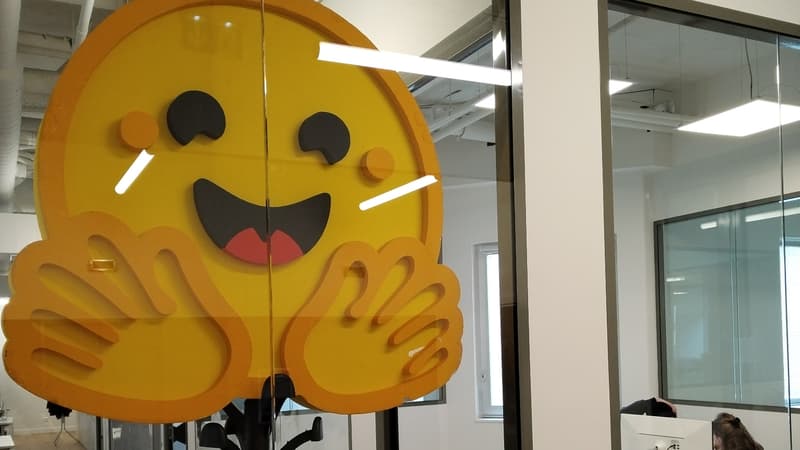“During the gold rush, it wasn’t the prospectors who got rich, it was the pick dealers.” Who will benefit from the AI fever that haunts the tech industry today, from American giants like Google and Microsoft to countless startups? Among the best-placed pickaxe sellers there are three Frenchmen.
Julien Chaumond, Clément Delangue and Thomas Wolf are today at the helm of one of the essential cogs in this growing ecosystem: the Hugging Face platform. A name still little known by the general public, and even less six years ago when the company had to go into exile in the United States to aspire to raise funds. “AI seemed so far away at the time that it was impossible to raise funds in France by investing for such a long term,” explains Tech&Co Thomas Wolf.
To say that the situation has changed would be an understatement. Each week brings its share of new AIs with amazing abilities, from automatic text typing to image creation through to rendering more true-to-life voices. And Hugging Face has managed to place itself at the center of this revolution.
The AI toolbox
Hugging Face is a do-it-all AI platform that is part toolkit, part library, and part sandbox. On the site, anyone can design their own AI, train it on their own or existing data sets, and publish it for everyone to use for free or comment on. As a GitHub (allowing anyone to store lines of code and make them available to everyone), Hugging Face hosts almost 150,000 models designed by its users.
Until recently, the platform mainly housed specialized language-processing programs, such as Google’s Bert model. But 2022 has been there. Among the most popular today are “text to image” models like Stable Diffusion, or its predecessor Craiyon, whose graphic style made it a favorite meme generator on social media.
But Hugging Face is not (just) an “AI app store”. The platform also houses certain essential parts for the construction of today’s main models. The Transformers library, which allows language models like ChatGPT to understand a sentence in context; o Diffusers, which allow Stable Diffusion to generate images from a group of pixels of random colors; these libraries are maintained by the Hugging Face teams, up-to-date and available to everyone. All this in open source.
Reconciliation of AI and ethics
Because Hugging Face also cultivates an image of an ethical and open company, unlike technological giants like Google or OpenAI, which very often keep the operation of their models or training data secret. “There is a lot of knowledge that is private and not shared around these models, we think it is not a healthy thing for the field in the long term”, believes Thomas Wolf.
This open policy is reflected in the price of the platform: it is free for individual users, with paid accounts only for large companies that have greater needs in terms of computing power. In May 2022, the platform had around 1,000 of these paid accounts, for companies like Renault or Bloomberg. Enough to increase revenue while still being open to the most creative researchers and users.
But the development of these AIs also raises concerns. Are there no risks in making so many powerful models available to anyone? Hugging Face claims to be aware of these dangers and is constantly thinking about how to reconcile AI and ethics.
Discretion around rotation
The company already employs big names in AI ethics research, including Margaret Mitchell, formerly at Google. Among its 160 employees, it has recently had a team specifically dedicated to these issues, responsible for designing ethics letters to guide its developers through complex moral questions.
These theoretical reflections must then be put into practice and evolve with time and changes in the law. What Hugging Face is all about, as he regularly publishes articles detailing his methodology for disseminating good practice. A protective and empathetic image summarized in the name of the company and its logo, a hug emoji.
Are ethics and open source compatible with profitability? The company refuses to give its figures publicly. The cost of computing resources required to process so many models is still very high, but Hugging Face seeks to reduce them, particularly through the privileged partnership with Amazon Web Services that began in 2021.
Point evokes revenue of $15 million in 2022 and optimistic prospects. “The machine learning community will multiply by 50 by 2030 because software developers will start,” co-founder Julien Chaumond promises in the weekly. For spike sellers, the future looks bright.
Source: BFM TV


